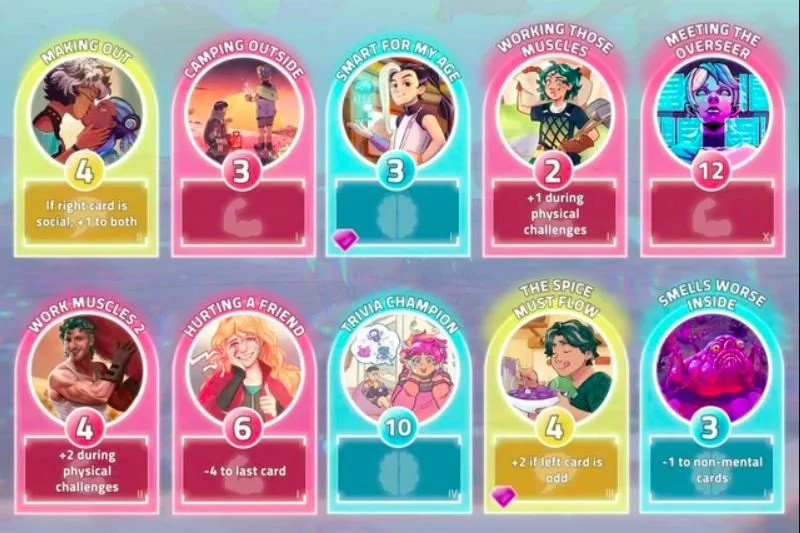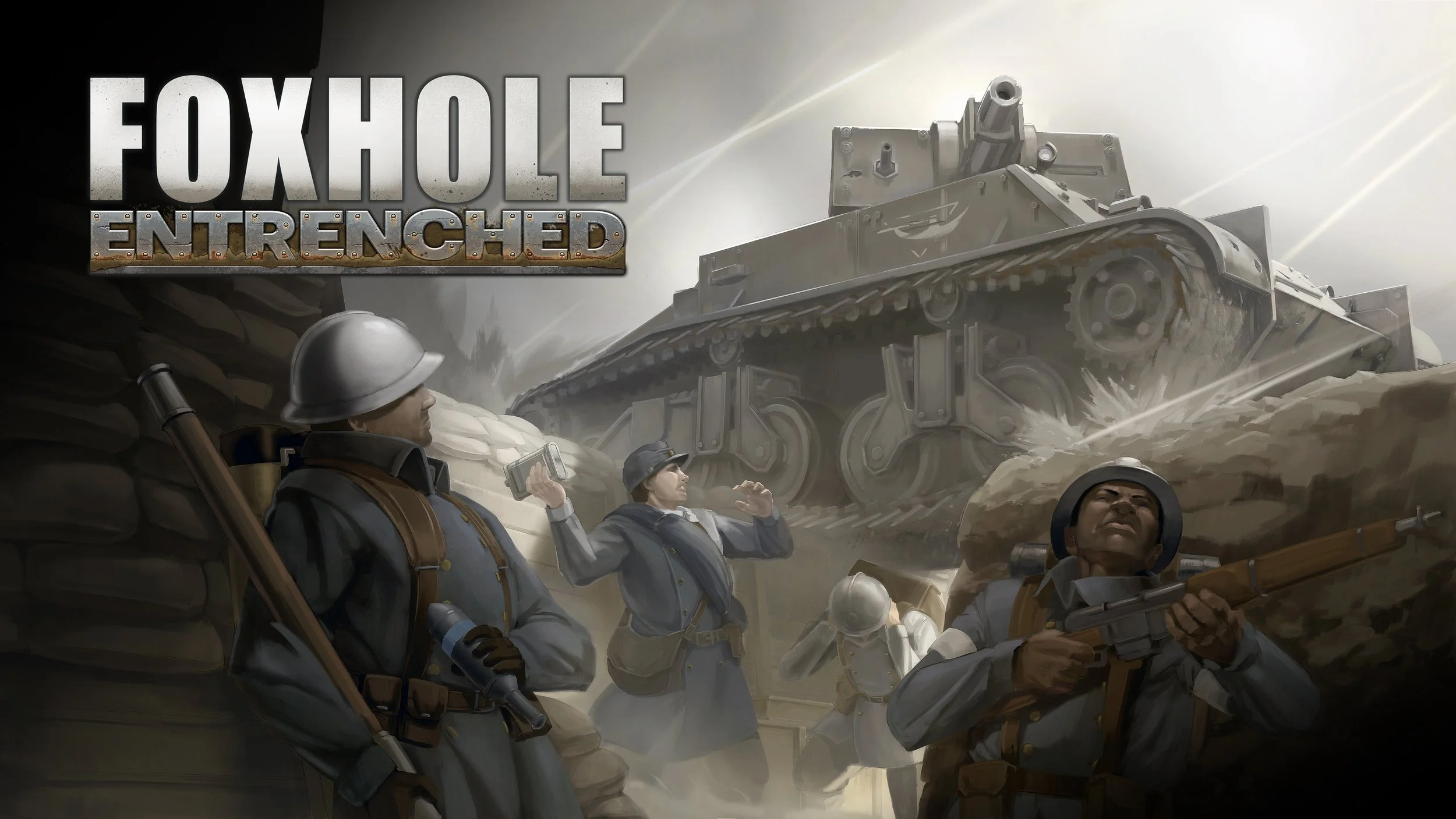Review | I Was A Teenage Exocolonist - Almost Famous
I was a Teenage Exocolonist hits a mark I never expected it to hit - how long it stayed on that mark is another thing.
Exocolonist is a deck-building life-sim, following the life of a young extraterrestrial colonist on the planet of Vertumna. Each yearly cycle gives the player the chance to expand on your character’s skills and experiences, culminating in a routine showdown with the game’s main adversary in the Glow season. The years bring new experiences and characters that influence the player and their story, but also includes some set events, such as a seasonal festival and your character's birthday. Your main role in this system is to be yourself! Live your life on this new, uncharted planet and become the person you want to be.
Remember that time you bumped into someone and you stepped to get out of their way and then they stepped in the same direction and you did that like five times? Yeah, that would be a 10 point memory for the phycological effect it would have.
It's a lovely system in practice. The game mechanics of the game are all designed to link back to its roots as a life-sim - the cards, known as ‘memories’, are all themed after events that actually happen in the game. One of the cards I received was a reward for doing well at the science fair, and it included art of my character absolutely winning the science fair. After some time I had built up a collection of cards that were based around my character's experiences. Every problem I found or challenge I faced was solved using a collection of my memories,my achievements and my feelings, throughout my life. This is a form of deckbuilding that brought me infinitely closer to my character than opening a pack and finding a ‘Blue Eyes, White Dragon’ could ever do.
Said challenges were usually found in the monthly activities on offer, such as studying in the engineering department or playing sportsball. Each activity added to my character's repertoire of life skills, like ‘combat’ and ‘biology’ or my nebulous abilities like ‘bravery’ or ‘empathy’. Becoming better at these skills would unlock more opportunities within the monthly system, giving the game a nice sense of progression. Another nice touch is the character creation system, which consists of two sliders, one for gender presentation and one for pronouns. The pronoun system is particularly impressive, allowing for the player to insert their own custom pronouns, giving players that extra bit of control over their life.. Building my character was one thing, but being my character was another. As with any life-sim, there is an element of roleplay. I got to experiment with what my character would be early on - when the first Glow season comes around you are offered the chance to either go out and fight the attackers or hide in your room. I, like the brave little twat I am, had spent a majority of my first year sneaking off into the wilds with Dys, a character who would make even the most dedicated goths look tame. This meant that I had lots of bravery as a skill, and I could unlock the option to go out and fight the weird dog thing that was trying to eat my parents. At the time I was ten years old. I will note that I did this for every glow season, and not once did a parent or guardian think I might need a bit more supervision.
Maybe you should just pet the terrifying alien creature?
The game is built to allow for this kind of dumb kid self expression - once I had started my ‘Leroy Jenkins’ streak of fighting wildlife I dedicated myself to making my character combat ready, and savvy enough to deal with any kind of terrifying issue that may present itself. In the end I became a skilled biologist who could shoot you at a kilometres distance. I am not sure if my real-life parents would be proud of me for that, but my scary in-game mum and virtual plant dad were more than happy with my progress.
On that note, let's talk characters. The game starts you off with a choice of bestie from your childhood who you get a small relationship boost with, and then you are free to interact with any of the characters you wish as the months progress. Like everything in Exocolonist, each character is connected to something else in some way. Most activities will give you a relationship boost with a character or two, which gives relationships a natural progression. “I know Cal because we spent a month weeding” makes a lot more sense than “I gave Cal a present every day and he agreed to marry me”. Sorry Stardew Valley, but Exocolonist has you beat on this one. These relationships do get a bit more complex as things progress and factions are formed in the more ‘adult’ world you reach in the later stages of the game, which is a nice and realistic type of thing to happen. Your childhood relationships become adult relationships, and things change. Your relationship with your parents changes too, depending on how rebellious or loyal you are to the colony.
Staring into the void of space on a foreign planet?Truly goth goals right here.
NEXT TWO PARAGRAPHS CONTAIN MILD SPOILERS
These are all amazing aspects, key ingredients in what a game like Exocolonist or any life-sim should have - but all this building of your character and relationships only matters if they amount to something worthwhile. With such an impressive set of tools to shape the story and expand your character and live a life, you’d expect Exocolonist to excel, but in some areas, it did leave me lacking. I am hesitant to say ‘disappointed’ - the overall experience of Exocolonist is brilliant, I loved living the life that it gave me and being shaped by the characters and events that it presented me with. It is, however, the ending of the game that becomes Exocolonist’s downfall. I built my character through twelve hours of gameplay - dedicated to every aspect of their abilities and skillset, their relationships and ideals, only to feel untested when it came to the finale of the game. I wanted to know if my brave, intelligent and combat-ready colonist was the right kind of person to be, but in the end, the final ‘event’ of the game came down to a single skill choice.
Everything is so much more stressful and serious when you are an adult… but on the bright side no one can tell you that you can’t get an awesome undercut.
It does have an aspect of replayability, and I respect that. It’s worked into the game wonderfully, but it's not for me. I love the idea of an overarching story that links multiple playthroughs, but for that to have an impact each step needs to feel important. In short, I don’t want to have to play through multiple shallow mini-endings to reach the ending ending. For ten hours I lived the life of a character that I had grown attached to, that meant something to me and that grows and changes through the experiences that we face together, and putting that character to one side to complete the story feels wrong. There is an ending scroll through images and explanations of what happens next in your story, but it just didn't feel like enough.
Exocolonist excels at being a life-sim, but forgets that it is a game. All the aspects are there to create a brilliant story of tragedy, triumph and romance - and you do get each of those in little dribs and drabs here and there. However, what Exocolonist lacks is a solid payoff for each step you take. When you spend so long with a character and invest so much time in them you need that payoff to make it all worthwhile - I wish that each character got their big moment or to do something impactful. But sadly, in Exocolonist, all my character does is that one final skill check. As a result, all I feel is railroaded and deflated.
Scary mom and plant dad are very cool, but in a believable way.
I want to make it clear that this is subjective - if you love time travel hijinks then get the game, it'll do it for you. My issue comes from a lack of gratification for the work I put into my character. The game itself is fun, the card aspect is a lovely example of mechanical/narrative synthesis, and the characters are all interesting and worth the time investment. The issue occurs when Exocolonist tries to tell its own grander story rather than the story of the player. I want to be able to play the game and have a story I can take away with me along with the character I inhabited. You can do that, but the game presents an idea with this replayability that there is a ‘perfect’ ending that you have to reach, but life is not perfect, nor should a life-sim be. If Exocolonist focused on each playthrough as a singular piece, I would have nothing bad to say.











